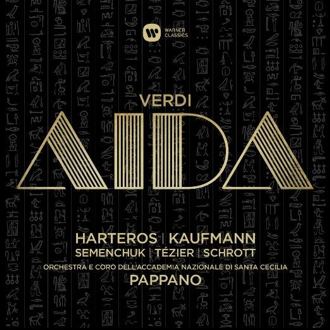 Sir
Anthony Pappano believes that Verdi’s Aida cannot be defined or labelled
“It’s a one-off in every sense. It is not an intimate opera neither is it a
grand opera.” Whatever its classification, Aida has an enduring popularity
that shows little sign of relenting. It was the Khedive of Egypt who
commissioned the score to mark the opening of the Khedivial Opera House, not
to celebrate the opening of the Suez Canal as according to popular myth.
Aida received its première in Cairo in 1871 although the first time Verdi
himself saw a production was at La Scala, Milan. Sir
Anthony Pappano believes that Verdi’s Aida cannot be defined or labelled
“It’s a one-off in every sense. It is not an intimate opera neither is it a
grand opera.” Whatever its classification, Aida has an enduring popularity
that shows little sign of relenting. It was the Khedive of Egypt who
commissioned the score to mark the opening of the Khedivial Opera House, not
to celebrate the opening of the Suez Canal as according to popular myth.
Aida received its première in Cairo in 1871 although the first time Verdi
himself saw a production was at La Scala, Milan.
Pappano has
assembled a strong international cast with starry names of the opera world
who excel in their performances. Warner Classics has dug deep into its
pockets for a lavish studio recording of a type that is usually ruled out in
these cost-conscious days. It was remarked upon that the rehearsals and
recording session, which took over a week, was like going back several
decades to the golden years of studio recordings. Striving to create a
special yet indefinable atmosphere it seems that Pappano was especially keen
to use the Sala Santa Cecilia, Auditorium Parco della Musica in Rome.
Anja Harteros is a classy artist who I saw most recently in 2014
together with Camilla Nylund and Christine Goerke performing scenes and
arias from Richard Strauss operas with the Staatskapelle Dresden under
Christian Thielmann at the Semperoper, Dresden. I notice that Anja Harteros
hadn’t previously sung the title role of Aida but one wouldn’t know from
this outstanding performance. A remarkable performer, she shines in the role
of the Ethiopian Princess captured as a slave girl, affording a convincingly
characterised performance. Aida’s romanzas Ritorna vincitor! and O patria
Mia are strikingly sung with the soprano not afraid to eschew beauty of tone
for utmost expression. With such excellent diction and smooth projection I
love the way Harteros can easily darken her tone. Remaining poised and
focused in approach she has that rare ability to draw the listener in. In my
view no soprano has yet equalled the quite glorious performances of Ritorna
vincitor! and O patria Mia by Leontyne Price which she recorded on the so
called ‘Blue Album’ in 1959 in Rome for RCA Victor.
Imprinted
strongly in the memory is the experience of Jonas Kaufmann performing
superbly at a Gala concert to celebrate the bicentennial of Wagner’s birth
at Semperoper, Dresden in 2013 (review). Kaufmann has the part of army
captain Radamès, infatuated by his love for Aida, who is embroiled in an
impossible situation. Singing the role for the first time Kaufmann is in
inspired voice engaging the listener as if living the role. As Radamès, he
is gifted with one of the most famous of all opera arias Celeste Aida, a
romanza he knows well as part of his solo concert repertoire. His voice is
full of reflection and sadness at leaving Aida behind and he reveals a
creamer timbre than usual. Especially remarkable is the tenor’s strikingly
dramatic high register at the conclusion.
No stranger to the role of
Princess Amneris, Ekaterina Semenchuk gives an impressive performance as the
cunning daughter of the Egyptian King. In Amneris’s challenging aria
L'abborrita rivale a me sfuggia one can almost touch the emotional turmoil.
She delivers a first-rate and highly expressive performance that reveals her
dark, burnished tone. Not too familiar with Semenchuk’s voice, I was
slightly surprised how she rather jolts up to her high register. Deeply
passionate, the duet with Radamès Già i sacerdoti adunansi, sees Semenchuk
and Kaufmann convincingly escalating the emotional tension.
As Ramfis
the High priest bass-baritone Erwin Schrott is unshakable. Steady, deep and
experienced, in Mortal, diletto ai Numi he displays his smooth voice to
splendid effect. Both bass Marco Spotti as Il Re and baritone Ludovic Tézier
as Amonasro acquit themselves commendably. Splendidly drilled by Ciro Visco,
Coro dell'Accademia Nazionale di Santa Cecilia is in remarkably powerful yet
eloquent voice. Under the baton of music director Pappano Orchestra
dell'Accademia Nazionale di Santa Cecilia shows its complete mastery of a
score which it knows so well. It is played with conviction and draws
remarkable dramatic tension. The excellence of the solo instruments is
conspicuous and rarely heard detail has been caught so well.
This is
a well presented set, consisting of a sturdy, hard-back case with a booklet
that contains most of the essential information. An interesting essay ‘An
Aida for our Age’ from George Loomis focuses on the recording session saying
virtually nothing about the work's conception. There is a short note from
the conductor, a good synopsis and most importantly full texts with an
English translation in the booklet.
Pappano demonstrates his prowess
in Verdi’s repertoire with this highly assured Aida. His starry cast
certainly live up to their reputations. This is an Aida to live with and to
treasure.
|